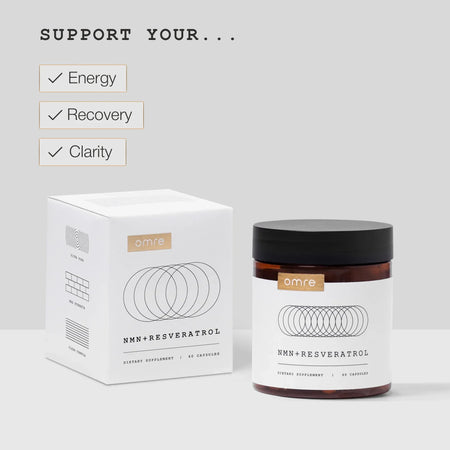NAD (Nicotinamide Adenine Dinucleotide) is a vital coenzyme found in every cell of our body, playing a crucial role in energy metabolism, DNA repair, and cell signaling. As we age, NAD levels naturally decline, which can lead to various health issues and a decrease in energy levels. This article will explore effective strategies to boost NAD levels, helping you maintain vitality and overall well-being.
How to Boost NAD Levels?
To boost NAD levels, consider incorporating a combination of dietary changes, supplements, and lifestyle modifications. Key approaches include increasing your intake of NAD precursors such as nicotinamide riboside (NR) and nicotinamide mononucleotide (NMN), consuming foods rich in tryptophan, exercising regularly, and ensuring adequate sleep. These methods support the body's natural production of NAD and improve its overall function.
Now, let’s delve deeper into these strategies to understand how they work and how you can implement them in your daily life.
1. Increase NAD Precursors
One of the most effective ways to boost NAD levels is by increasing the intake of its precursors. Two of the most popular NAD precursors are:
- Nicotinamide Riboside (NR): NR is a form of vitamin B3 that has been shown to raise NAD levels in the body. Available as a supplement, studies suggest that it can improve metabolic health and increase energy levels.
- Nicotinamide Mononucleotide (NMN): NMN is another precursor that directly contributes to NAD synthesis. Like NR, NMN supplements can enhance NAD levels and have been linked to anti-aging benefits.
2. Consume Foods Rich in Tryptophan
Tryptophan is an essential amino acid that the body can convert into NAD. Including foods high in tryptophan in your diet can help naturally elevate your NAD levels. Some excellent sources of tryptophan include:
- Turkey
- Chicken
- Fish
- Nuts and seeds
- Cheese
- Tofu
- Legumes
Incorporating these foods into your meals can help support the production of NAD in your body.
3. Regular Exercise
Engaging in regular physical activity has been shown to boost NAD levels significantly. Exercise increases the demand for energy in your cells, leading to enhanced NAD synthesis. Activities such as:
- Aerobic exercises (running, cycling, swimming)
- Strength training
- High-Intensity Interval Training (HIIT)
These forms of exercise not only promote overall health but also encourage your body to produce more NAD, contributing to improved energy levels and metabolic function.
4. Optimize Sleep Quality
Quality sleep is essential for maintaining healthy NAD levels. During sleep, the body undergoes repair processes that can significantly affect NAD metabolism. Here are some tips to optimize your sleep:
- Establish a regular sleep schedule by going to bed and waking up at the same time each day.
- Create a relaxing bedtime routine to signal your body that it's time to wind down.
- Keep your sleep environment cool, dark, and quiet.
- Avoid screens and blue light exposure at least an hour before bed.
By prioritizing quality sleep, you can support your body's natural processes that boost NAD levels.
5. Consider Intermittent Fasting
Intermittent fasting (IF) is a dietary approach that involves cycling between periods of eating and fasting. Research indicates that IF can enhance NAD levels by activating cellular pathways associated with NAD metabolism. Some popular methods of intermittent fasting include:
- 16/8 method: Fast for 16 hours and eat during an 8-hour window.
- 5:2 diet: Eat normally for five days, and restrict calorie intake to about 500-600 calories for two non-consecutive days.
By incorporating intermittent fasting into your routine, you may be able to stimulate NAD production and improve your overall health.
6. Avoid Excessive Alcohol Consumption
Excessive alcohol intake can deplete NAD levels in the body. Alcohol metabolism requires NAD, which can lead to a decrease in the available pool of this coenzyme. To maintain optimal NAD levels, it is advisable to limit alcohol consumption and choose healthier alternatives.
7. Supplement with Resveratrol and Other Compounds
Resveratrol, a polyphenol found in red wine, grapes, and berries, has been linked to increased NAD levels. This compound activates sirtuins, a group of proteins that require NAD to function and are associated with longevity and cellular health. Consider adding resveratrol supplements or foods rich in this compound to your diet to support NAD levels.
8. Stay Hydrated
Staying well-hydrated is essential for overall cellular function, including NAD metabolism. Ensure you drink plenty of water throughout the day to support your body's processes, including NAD production. Aim for at least 8-10 glasses of water daily, adjusting based on your activity level and climate.
Conclusion
Boosting NAD levels is achievable through a combination of dietary changes, lifestyle adjustments, and supplementation. By focusing on natural NAD precursors, engaging in regular exercise, optimizing sleep, and incorporating healthy habits, you can enhance your energy levels and promote better overall health. Remember that individual results may vary, and it's always advisable to consult with a healthcare professional before starting any new supplement or dietary regimen.
Stay Sharp, Stay Energized, Stay Ahead
Aging doesn’t have to slow you down. NMN + Resveratrol is your key to sustained energy, sharper focus, and long-term vitality. Whether you're a high performer pushing boundaries, a biohacker optimizing every aspect of life, or a parent looking to keep up with the demands of daily life, this powerful combination fuels your body at the cellular level.
Backed by science and trusted by those who refuse to settle for average aging, NMN + Resveratrol helps you stay ahead—today, tomorrow, and for years to come.
Experience the benefits for yourself. Start your journey to better aging now!
Try NMN + Resveratrol Today!
NMN + RESVERATROL
Cellular NAD+ booster with ultra‑pure NMN and Resveratrol, at research‑backed doses.*
Read more:


